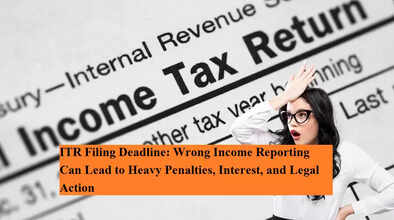ITR Filing Deadline: Wrong Income Reporting Can Lead to Heavy Penalties, Interest, and Legal Action

The deadline for filing Income Tax Returns (ITR) for the financial year 2025-26 is just around the corner—September 15, 2025. Taxpayers who are yet to file must act quickly, but also carefully. Filing incorrect details or underreporting income may result in hefty fines, interest charges, and even legal action.
The Income Tax Act, Section 270A makes it clear:
-
Underreporting of income can attract a penalty of up to 50% of the tax due.
-
Misreporting of income is considered even more serious, with penalties as high as 200% of the tax amount.
-
In severe cases of deliberate tax evasion, prosecution and imprisonment are also possible.
What Is Underreporting of Income?
Underreporting occurs when a taxpayer declares a lower income than the actual income earned. This could mean not including certain sources of taxable income in the ITR.
-
Example: If you earned interest income, capital gains, or freelance income but failed to declare it, it counts as underreporting.
-
While underreporting can sometimes happen due to oversight, it significantly affects tax calculation.
What Is Misreporting of Income?
Misreporting goes a step further and involves false or misleading information. This could include:
-
Claiming incorrect deductions or exemptions.
-
Providing wrong details about income sources.
-
Hiding certain earnings altogether.
Misreporting is often seen as intentional tax evasion and is treated as a serious offense under tax laws.
Why Accurate Reporting Is Crucial
Reporting your income truthfully is not just about following the law; it also ensures financial safety. Submitting wrong details can:
-
Increase your tax burden later due to penalties and interest.
-
Trigger legal proceedings in extreme cases.
-
Damage your credibility for future financial dealings, such as loans or visas.
How Heavy Can Penalties Be?
Under Section 270A of the Income Tax Act:
-
For underreporting, the penalty is 50% of the tax payable on the underreported income.
-
For misreporting, the penalty rises sharply to 200% of the tax payable.
For example, if your underreported income leads to an additional tax liability of ₹1 lakh:
-
Penalty for underreporting = ₹50,000.
-
Penalty for misreporting = ₹2,00,000.
This is over and above the tax and interest you already owe.
Risk of Interest and Notices
In addition to penalties, taxpayers may also have to pay interest under Sections 234A, 234B, and 234C for late or insufficient tax payments.
-
The Income Tax Department cross-checks ITR data with bank records, Form 26AS, AIS (Annual Information Statement), and other financial reports.
-
Any mismatch or misreporting could trigger a tax notice.
Key Takeaways for Taxpayers
-
Deadline Alert: File your ITR by September 15, 2025 to avoid late fees.
-
Be Accurate: Ensure all sources of income—salary, investments, rent, capital gains—are reported.
-
Avoid Misreporting: Never falsify deductions or exemptions; it can lead to penalties up to 200%.
-
Stay Compliant: Regularly check Form 26AS and AIS to match your records with government data.
Bottom Line
Filing your ITR on time is important, but filing it correctly is even more critical. Even small errors in reporting income can attract penalties, interest, or legal trouble. With the deadline just a day away, taxpayers must carefully review their returns to ensure accuracy and compliance.

